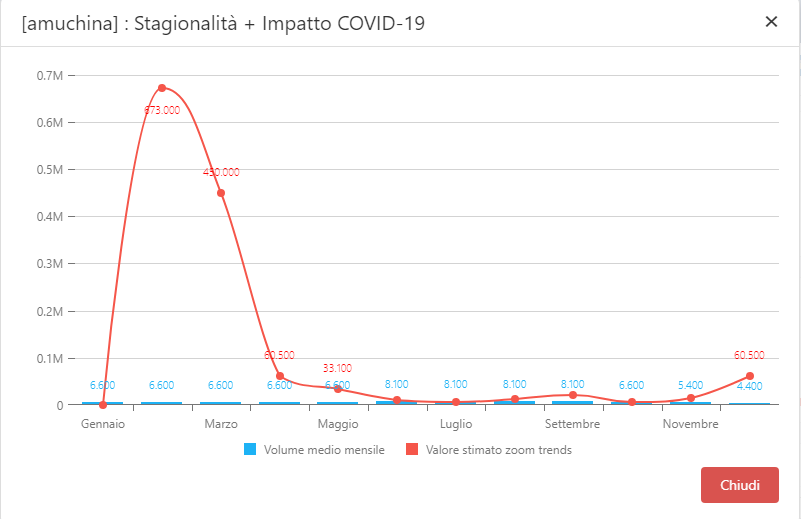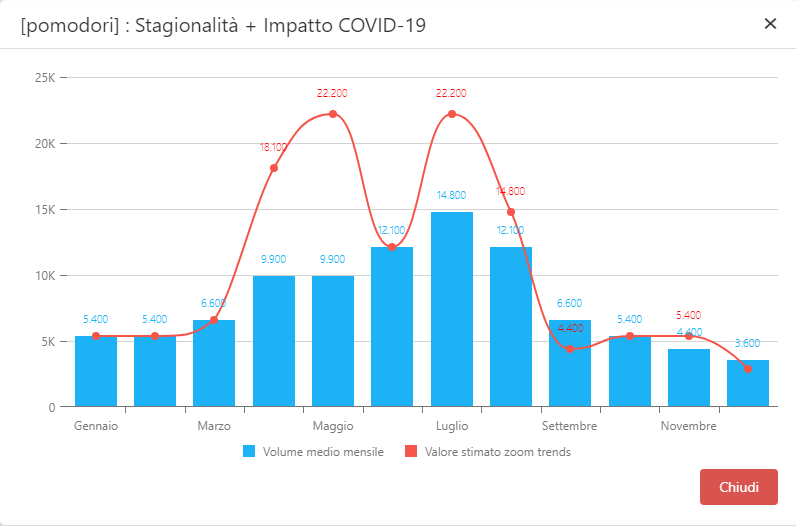2020 on Google, analysis of a weird year
A “strange” year, or weird to use the adjective chosen by Lizzy Harvey and Gari Illyes in the post on the new Google Search Central blog: it is time for budgets and even this particular 2020 does not escape tradition! This is what emerges from the analysis of trends in recent months, with a specific focus on the most searched keywords on Google by our fellow Italian people.
A report on 2020
We found new ways to work and collaborate, to learn and have fun and also to be safe, write the two Googlers before going to learn more about the main innovations of the Google ecosystem.
The biggest change is the one concerning work from home, that unites many digital realities (ours, too): as for Google, it emphasizes how the company has found ways to ensure productivity, and in particular the Search Console team does not seem to have slowed down compared to the standard rhythms.
Latest news on the technical front
The team has launched new reports, features and updates, which have generated extremely positive reactions on Twitter. Among the main ones, the article recalls:
- Removals tool
- Search Console API updates
- Report on crawling statistics
- Data export
Gary and Lizzy also summarize the announcement of the Google Page Experience update based on new speed and UX metrics, including the Core Web Vitals, “which we think you should consider for your website, also because they will become a ranking factor” from next May 2021.
Still on the technical front, the Googlebot team has turned its attention to speed and resource management: an example is the start – in mid-November – of the scanning of sites on HTTP2, “which is the next generation of the transfer protocol that feeds the Web”, a step that “will save a significant amount of resources for both sites and Googlebot”.
No less important – in terms of simplification – is the choice to transfer the blog and rename all the main information channels of the group with the name Google Search Central: as the post explains, “we wanted to have all the information related to the search of Google in one place for some time, but we had not had the courage to actually achieve it”, also because “site migrations are difficult, or at least so we heard”. And “we were not disappointed (it was really difficult), but in the process we made new friends that proved to be very helpful”, they say ironically, in reference to the new mascot that now accompanies Googlebot
Working and learning from home
But 2020 was above all a year “on remote” and even the Googlers have come to terms with the new daily life imposed by the pandemic, and if they usually passed “most of our time traveling, going from one conference to another and helping people with their websites, this year was a bit different, to say the least”.
To stay in touch with the community, Google has focused a lot on video and audio content and the article cites some of the examples, such as the podcast series Search Off the Record which, between jokes and serious talks, spills some “secrets” of the Google Search system.
The Youtube channel is very active, even if the videos “are much more complicated to record from home”, because “being in front of the camera in a studio, with all the help of the staff, is a completely different experience” and manage aspects like “setting the lights, the camera, the recording system, the bitrates and the control of the noise level of the neighbors can be unexpectedly challenging“. Despite this, they always continue with irony, “we published a series of videos: Daniel talked a lot about Search Console, John became a news anchor and a person who stays at home with whom to make hangouts online” and Aurora Morales tripled in the new series dedicated to the monetization of the sites.
Moreover, even conferences for webmasters have moved on an online medium and “we launched the first Virtual Unconference, an event that is not a conference, but somehow it is still”, which will be replicated on more occasions “exploiting all the knowledge gathered during the first event”.
The neverending support to who works and searches online
The latest focus is on the continuous support that Google has guaranteed to all those who have used the search engine for their needs: “Since the beginning of our transition to remote work, we have been thinking about how we can best help others find information online, keep their businesses afloat and also support those who need to get critical information in front of people”.
And so, they remember, “we launched research results with the Specialannouncement markup, which help health organizations deliver the right information to users, we published a guide on how to pause an online activity and how to communicate to users changes in events”.
Preparing for 2021
Ultimately, say Lizzy and Gary, “this has been a year different from any other before, but we have learned a lot about how we can work together in new ways to make things work”.
Now “we know that some things can be learned online without problems, that we can record remotely to help site owners with new information and that we can launch new features”, but “we miss human interactions and hope to see each other in person in 2021″.
Search trends on Google Italy
The final message of the two Googlers kinds of summarizes 2020, which in its complexity emerges from the analysis of trends on the main queries requested by users to the search engine – published by the Italian blog of the company.
According to the study, “2020 was the year of what it means…? , why…? , how to do…?” , and by far the first trend research in Italy was Coronavirus, as in the rest of the world. More specifically, however, people have “placed to the search engine questions such as why it is called covid-19? and what does pandemic mean? , how to make bread at home, and then we looked for places near us so as to move as little as possible: the bakery, the gas station, the florist near me“.
And exactly the “near me” searches have been those that have had the greatest increase, practically doubling the volume compared to the historical data.
The most searched keywords on Google in 2020
The team of Google Italy also revealed what were the 10 absolutely most searched keywords on the search engine in 2020:
- Coronavirus
- Usa Elections
- Classroom
- Weschool
- New Dpcm
- Diego Armando Maradona
- Kobe Bryant
- Meet
- Infections
- Civil Protection
The researches of the Italians, then, have inevitably concerned the Covid-19 pandemic with the words coronavirus, infections, Civil Protection, new dpcm, but also with the tools to work, study or communicate at a distance (classroom, weschool and meet). There are also topics of different breath, such as national or international politics, or sport – where, however, the research peaks were mainly for current news, such as the disappearance of two iconic champions such as Diego Armando Maradona and Kobe Bryant.
Very interesting are the new trends on informational keywords: for “how to do” the first 5 requests were Bread at home; Antivirus masks; Brewer’s yeast; Pizza; Amuchina (the most common brand of sanitizer gels here in Italy)” (and therefore, again effects of the pandemic, including concerns about the preparation of food at home and attempts to replicate new products of daily use for safety).
In the DIY category (for the person) we still find the Amuchina, followed by keyword related to aesthetics (Hair Mask; Scrub; Hair Dye and Waxing). For the DIY (at home) instead we can see the comeback of kitchen recipes and craft devices such as Chicken Coop, Barbecue, Mosquito Nets, Incubator and Compost.
Among the Whys of the year, Google has frequently responded to “Why Vote Yes to the Referendum”, “Why It Is Called Coronavirus”, “Why Brooms Stand”, “Why Vote No to the Referendum” and “Why Australia Burns”, but also “Why few deaths in Germany” and “Why one dies of coronavirus”.
Interesting is also the analysis of the trends on the products to cultivate: tomatoes win the race by far, overcoming strawberries, potatoes, zucchini and aubergines at least on the search engine (but we do not know if the same is true in the actual choices in the gardens of the Italians).
SEOZoom data
If these are the general trends collected by Google, with our Covid-19 Impact algorithm we measured the variations a bit to understand precisely what was the real numerical impact of new researches on traditional volumes.
So, we actually find that tomatoes were among the protagonists of Italian researches – with peaks in May and July, when the average monthly volume reached the estimated value of 22,200 against a classic seasonal average of 9,900, even if the trend has then fallen with the softening of bans and with the arrival of the cold season, enemy of crops – as well as eggplants (as much as 60,500 researches estimated in July) and strawberries (74 thousand researches in May!).
Amuchina was undoubtedly one of the 2020 keyword in Italy: the historical research average was around 6,600, but already in February our algorithm revealed that the interest was more than a hundred times higher (673 thousand monthly average searches) and currently continues to be 10 times higher than in the past. Same thing for mask, which has become perhaps the most used garment in Italy and in the world: from a very low historical research volume, amounting to about 1,300 monthly visits, the keyword has risen to 74 thousand searches in May and now still reaches 10 thousands.
Similar is the boom for bread and pizza (especially for recipes that explained the procedures for home preparation), already cited as major trends in our first study on the effects of Coronavirus on organic searches: from an average of 22,200 and 90,500 searches per month respectively, these two keywords have passed to volumes much more substantial. The bread had its peak in 110 thousand searches in April and May (full lockdown), while the pizza in March flew to 246 thousand searches, keeping itself above average even in the following months (despite the subsequent loosening of the prohibitions).





